

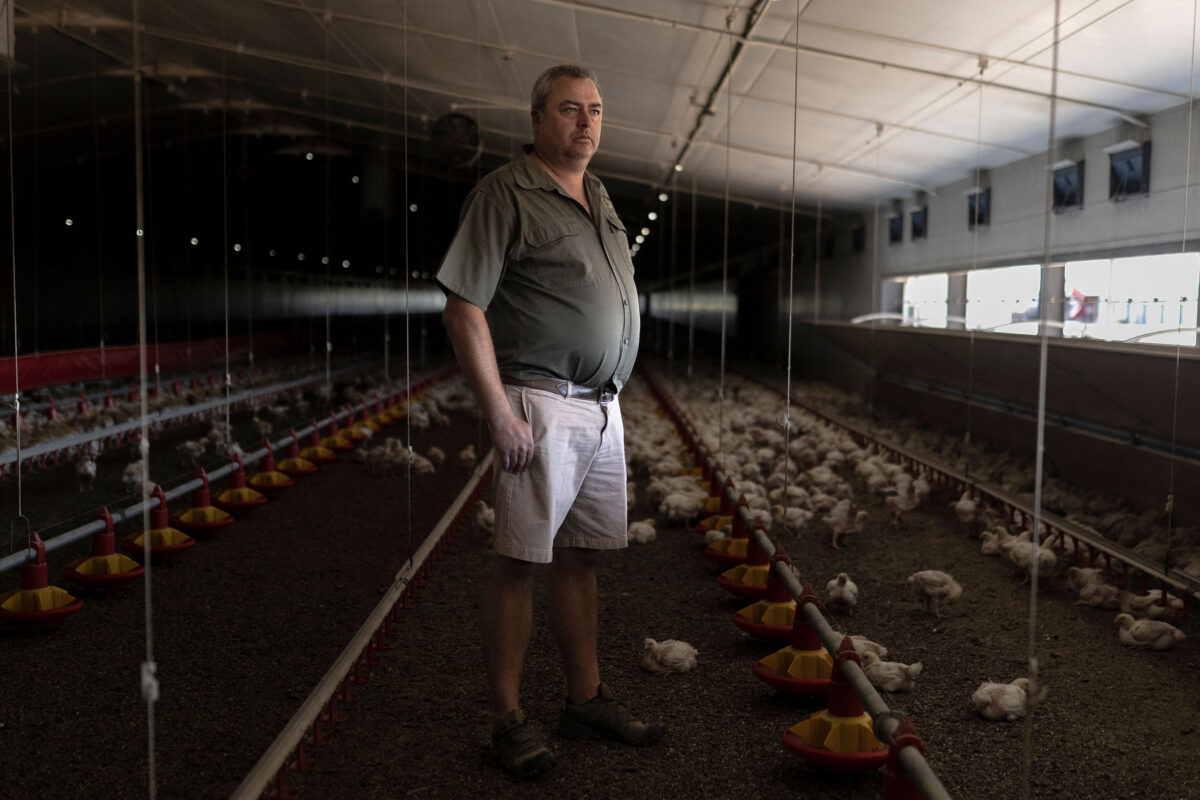
Herman du Preez planted his boots in the red dust at the entrance to one of his chicken sheds, its silver coating gleaming in the sunlight. He folded his thick, brown forearms across his chest, and declared quietly, but firmly: “I’ve had enough.”
The 46-year-old fourth-generation farmer in South Africa’s arid North West Province exuded strength, but his eyes were red and watery from fatigue and stress.
“I can’t go on like this,” he told The Epoch Times. “I’m losing thousands of birds every day. They’re suffocating and dying of heatstroke because no electricity means I can’t pump oxygen and cool air into my sheds.”
Du Preez runs some equipment using solar energy and diesel generators, but they’re not powerful enough to drive the massive aeration systems he needs to keep almost a million birds alive every day during the heat of the South African summer.
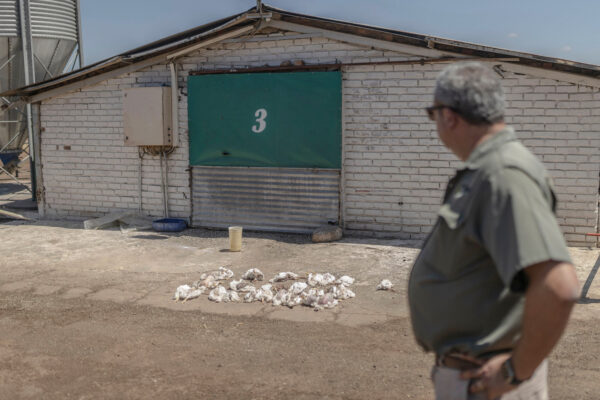
A few weeks ago, when he didn’t have electricity for two days, he lost 50,000 chickens. Du Preez is now suing the county’s state-controlled energy corporation, Eskom, for 2 million rands (almost $115,000) for loss of income.
“They actually owe me much more than that,” he said. “When the electricity comes back on suddenly, it causes surges that blow my pumps and motors. This government is stuffing up everything my family has been building since the 1930s.”
Nicol Jansen, deputy president of South Africa’s biggest agricultural association, Agri SA, told The Epoch Times: “Farmers need a reliable power supply to run cooling, irrigation, and pumping systems.
“Only our really big farmers have the means to move away from the state’s power grid, and then only partially so. Farmers are forfeiting their water quotas in order to irrigate when the power’s off. This is a loss they can’t recover; it’s paralyzing farms.”
Years of self-acknowledged corruption and failure to maintain coal-fired power stations by the governing African National Congress (ANC) have plunged South Africa into long periods of darkness for the past 15 years.
In 1998, Eskom warned President Nelson Mandela’s administration that unless new and more sophisticated power plants were built immediately, and infrastructure upgraded, the electricity grid “would begin imploding within a decade.”
The ANC ignored the advice and fired most of Eskom’s white experts based on its policy of Black Economic Empowerment.
In 2008, South Africa experienced its first wave of debilitating blackouts.
But, instead of taking action to end the crisis, the ANC made it much worse.
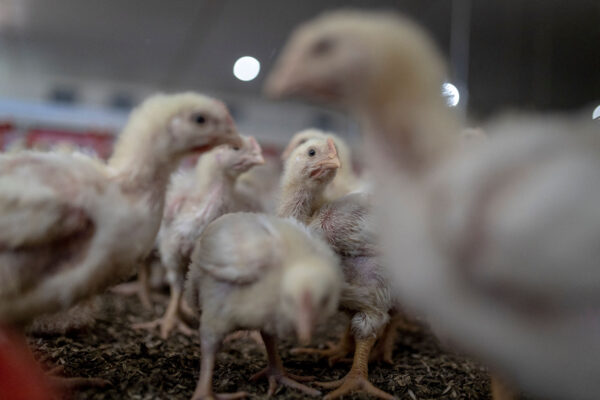
A commission of inquiry in 2021 found that former president Jacob Zuma, in cahoots with several top ANC officials, appointed allies to loot Eskom.
During the Zuma years—between 2009 and 2018—multibillion-dollar contracts to build new power stations were awarded fraudulently to ANC-linked companies. The power plants are today largely dysfunctional, having been poorly constructed and filled with equipment that doesn’t work.
Commission head, and now chief justice, Raymond Zondo, has found that the ANC continues to benefit from coal contracts, and that organized crime syndicates allegedly linked to the ANC continue to steal coal, equipment, and diesel, further disrupting the corporation’s attempts to keep the lights on.
In July 2022, the electricity crisis in the continent’s second-largest and most industrialized economy reached new heights, with the power off for up to 12 hours a day across the country. The long outages persist today, with President Cyril Ramaphosa recently declaring a national state of disaster.
This, he told the nation, would allow the government and Eskom to bypass “normal procedures” with regard to procurement of goods and services, which would allow the power producer to repair broken equipment “much faster.”
“Our analysis shows South Africa’s economy loses at least 4 billion rands (almost $230 million) a day during stage 6 load-shedding,” Isaiah Mhlanga, chief economist at Alexander Forbes, one of Africa’s leading financial services organizations, told The Epoch Times.
Eskom, named “The World’s Best Power Company” by the Financial Times in 2001, is no longer able to generate enough electricity to supply South Africa simultaneously.
So, every day, it cuts electricity in stages numbered from one to eight. It does this to “shed load” from the system, so as to prevent the collapse of the grid.
Stage one sees electricity off for two-and-a-half hours a day; stage 8 makes provision for between 12 and 16 hours a day and possibly longer.
Local and international agricultural organizations are warning that South Africa, one of Africa’s traditional “breadbaskets,” will soon be food insecure itself, should the blackouts last much longer.
They’re going to, according to outgoing Eskom CEO Andre de Ruyter, who recently told the country via press release that electricity “breakdowns” would endure for at least the next two years.
Farmers, unable to power irrigation and cooling systems, are going bankrupt.
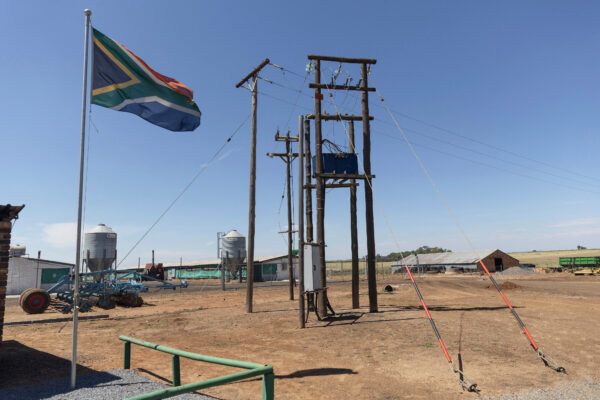
Bennie van Zyl, CEO of the Transvaal Agricultural Union, told The Epoch Times some had taken their own lives.
“South African farmers are recognized as some of the best in the world. We’re welcome everywhere. Hundreds are in Ukraine, for example, where they helped it become a major grain exporter. But sometimes it doesn’t feel as if we are welcome in our own country.”
Agricultural unions have applied repeatedly to Eskom and the government for farmers in areas of high food production to be exempt from load-shedding to no avail.
According to the United Nations Food and Agriculture Organization, South Africa is the 5th largest producer of cereals in the world and the 7th largest maize grower.
Maize is its staple crop, and it usually produces enough to feed itself and export millions of tons, mostly to other African nations.
Last season, however, maize output dropped more than 20 percent.
“This is a direct result of the fallout from load-shedding,” said Jansen. “Farmers are planting less because they can’t irrigate lands.
“It’s not possible to irrigate enough water in the summer, the electricity isn’t on long enough to irrigate the 60mm needed in an average week. Yield and crop losses are inevitable.”
Jansen said South Africa’s set to lose billions of dollars in export revenue because farmers would not be able to supply international markets with fresh produce.
“We won’t be able to honor our commitments in terms of the contracts we have in Europe, especially. When the next season comes around, our traditional clients will look elsewhere for fruit and vegetables,” he said.
“This is a catastrophe of immense proportions, on so many levels, not least reputational damage, and we’re going to be dealing with the implications for many, many years to come.”
Van Zyl said farmers are currently unable to grow feed.
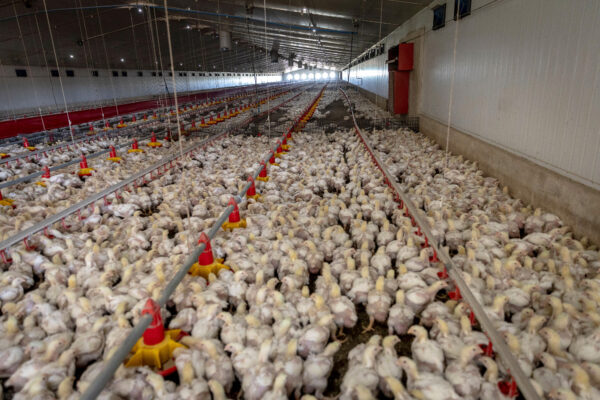
“When winter comes, we won’t have enough for them to eat. Many will not survive the winter,” he forecast.
On Feb. 3, the National Federation of Agricultural Organizations wrote to Ramaphosa’s Disaster Management Team, again asking for food producers to be given “immediate relief.”
This, said the federation, should come in the form of exemption from load-shedding, and state-subsidized diesel to run emergency generators.
Unless farmers get reliable electricity immediately, it warned, South Africa and countries reliant on it for food would face hunger, malnutrition, and possibly famine “within months.”
South Africa’s also one of the globe’s major fruit producers, and its wine and sugar industries are huge earners of foreign currency in terms of exports.
“Our fruit producers in particular are in big trouble because they can’t keep their produce cool. That means they can’t export to our biggest markets in Europe. The wine farmers can’t irrigate their vineyards. We are facing immense losses in these areas,” said Van Zyl.
Almost 4,500 dairy farmers are also threatened because they can’t keep milk cool ahead of transport to markets.
“Maize, our staple crop, is being decimated by this ANC-driven crisis. Farmers can’t irrigate during heatwaves,” said Van Zyl. “Poultry, South Africa’s most important animal protein source for millions of poor people, is also in big trouble.
“Chicken farmers are losing millions of birds because they can’t operate ventilation systems to keep the birds from suffocating. This, in turn, is causing poultry shortages, which is going to lead to price increases.”
The Epoch Times spoke to sources at some of the country’s biggest fast food outlets, including KFC and Nando’s, who confirmed closures of branches because of the inability to source enough chicken.
No electricity also means abattoirs delay slaughtering birds, because they can’t keep enough carcasses cold. This means producers spend much more on feed, keeping chickens alive which should have been on supermarket shelves months ago.
From the big commercial farmers to the tiny smallholder producers, no one is immune from the ravages of the electricity crisis.
Livestock farmer Davis Mokushane once ran a successful ranch and butchery. But he said his business near Pretoria is “no more.”
“The meat was getting bad; rotten. Obviously, I had to close down the shop. There are some people who’ve lost their job; I was employing four people … We’re not making money. We’re not sure when this situation’s going to improve.”
South Africa’s biggest poultry producer, Astral Foods, said its earnings dropped by 90 percent over six months of rolling blackouts. In that period, it said, its lost production amounted to 12 million birds, and almost 140 million rand.
In its latest Food Inflation Brief, the United States Bureau for Food and Agricultural Policy warned of the consequences of the continuing power cuts on the South African agricultural and food sectors.
The brief stated: “We expect that load-shedding will be a key factor that prevents South Africa from following the global trends of decreasing food price inflation during 2023.”
The Trading Economics website said the food inflation rate in South Africa in December was 12.4 percent, the highest reading since at least April 2009.
Agri SA said the agricultural sector lost more than 23 billion rands during nine months of load-shedding last year, adding the loss could be exceeded in 2023, threatening the sustainability of the sector and the 800,000 jobs it provides.
The organization’s CEO, Christo van der Rheede, told The Epoch Times: “The government and Eskom have proposed medium to long-term solutions to this disaster, but no immediate solutions or even suggestions about how food producers can be helped right now.
“There seems to be a fundamental lack of attention to what this is going to mean for the future of food security in South Africa and many other African countries.”
Back on his farm, Herman du Preez’s anger at yet another electricity outage was as palpable as the stench of rotting chicken carcasses.
He scoffed: “I’d like to know where else in the world can you cause a disaster, then declare a state of disaster, and then you promise a nation you are the right people to fix the disaster! And then you have conferences where you say, ‘People should be thankful that they have the ANC because it is the only one with a good plan to get energy security in the country. It’s a bloody joke!”
But, fewer South Africans are laughing these days at the ineptitude of their government, especially since its energy regulator announced a whopping 18.65 percent increase in the price of electricity, beginning on April 1.
“So, we must now pay for something we don’t get?” asked Du Preez. “No wonder it starts on April Fool’s Day.”
